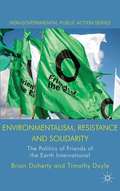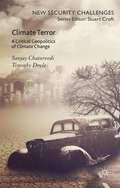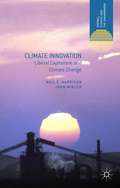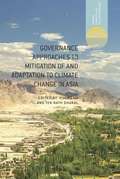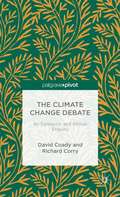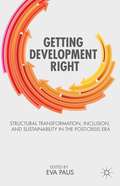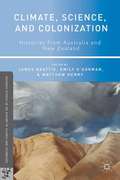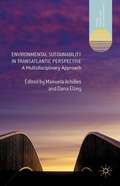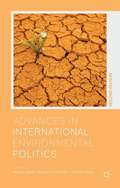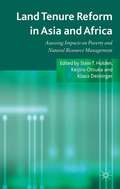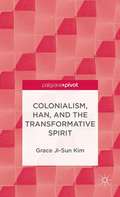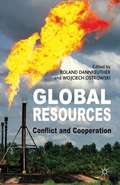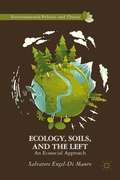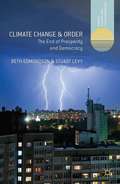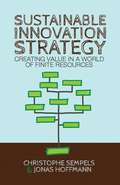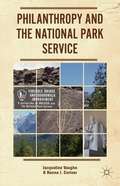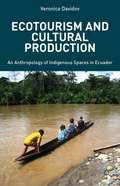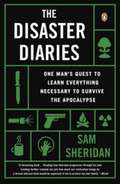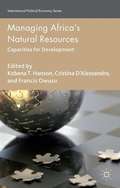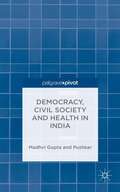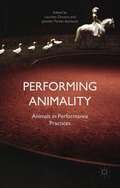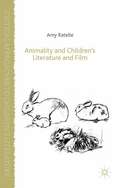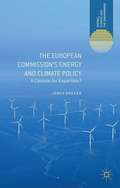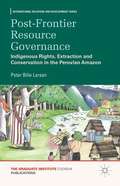- Table View
- List View
Environmentalism, Resistance and Solidarity
by Brian Doherty Timothy DoyleIn the first detailed study of how a major environmental NGO works transnationally, Brian Doherty and Timothy Doyle examine the relationships between the 74 national organizations of Friends of the Earth International. Drawing from a rich mix of survey data, interviews, archival sources and access to internal meetings, they show how FoEI has developed a distinctive international environmentalism, which allows for the differences in context between regions and across the North-South divide. Following the expansion of FoEI into the global South, the challenges it then faced over questions of ideology, organization and campaign strategy are examined over a twenty year period. The book demonstrates the development of an FoEI tradition of solidarity which accounts for its ability to overcome internal crises and pursue joint campaigns despite conflicting understandings of politics between its national organizations.
Climate Terror
by Sanjay Chaturvedi Timothy DoyleClimate Terror investigates the highly differentiated geographical politics of global warming. It explores how fear-inducing climate change discourses could result in new forms of dependencies, domination and militarized 'climate security'. In this revealing study from Chaturvedi and Doyle, the concept of environmental security is brought to life through cases of the most pressing environmental issues confronting the Global South, which are creating desperate realities for billions of people. The book proposes the following key questions, crucial to our understanding of this issue: Can the climate discourse be re-configured to provide a place where issues of environmental justice and sovereignty are paramount, rather than neo-liberal responses to climate? Can climate change give a voice to the global periphery, and can it be used as a vehicle for emancipation? Chaturvedi and Doyle's study concludes by taking note of the more optimistic response of 'emancipatory' groups and networks to concepts such as climate justice and climate debt, and the ways in which these groups have attempted to use this global climate moment for more democratic purposes. Is the climate story, regardless of its diverse intentions, a discourse now captured by the affluent North to control the development of the Global South? Has the emancipatory moment now passed or is there still hope for the re-emergence of subaltern perspectives on climate futures? The authors further discuss the deployment of terror vocabulary to address climate change, which is a part of refurbished designs and technologies of control, regulation and domination in a neo-liberal, post-political, globalized world marked by profound asymmetries in terms of economic growth and human development. They argue for an increased understanding of the environment, not as an external enemy force, but as adiverse nature that is inclusive of people, a nature that has the potential to provide secure access to citizens of all countries to basic nutrition, adequate access to health, appropriate shelter, and a security to practice a diverse range of livelihoods.
Climate Innovation
by Neil E. Harrison John MiklerA comprehensive examination of the inability of liberal capitalism to generate the technological innovations necessary to prevent dangerous climate change. The case is made for the need for institutional evolution to drive the climate innovation, and the potential for climate innovation in an increasingly economically interconnected world.
Governance Approaches to Mitigation of and Adaptation to Climate Change in Asia
by Huong Ha Tek Nath DhakalAcademics and practitioners from across Asia and beyond revisit the issues and impact of climate change in Asia. They examine the preconditions for good governance regarding climate change, and the role of state and non-state actors in climate change governance, and explore different political-legal frameworks.
The Climate Change Debate: An Epistemic and Ethical Enquiry
by David Coady Richard CorryOf the two kinds of philosophical questions - epistemic and ethical - raised by the public debate about climate change, professional philosophers have dealt almost exclusively with the ethical. This book is the first to address both and examine the relationship between them.
Landscape and Literature 1830–1914
by Roger EbbatsonThis study examines the vital centrality of 'readings' of nature in a variety of literary forms in the period 1830-1914. It is exploratory and original in approach, stressing the philosophical and cultural implications in a range of texts from Tennyson, Hardy, Jefferies and Thomas.
Getting Development Right
by Eva PausThe celebratory tone about the emergence of the BRICs and the improved growth in Sub Saharan Africa and Latin America during the 2000s obscures the reality that, for large parts of the developing world, the development challenges are more acute than ever before. After three decades of Washington Consensus policies, deepening globalization, and China's and India's increasing competitiveness in ever more goods and services, many developing countries are now facing three critical challenges: how to engender a transformation of the production structure that creates many more productive jobs, how to make growth more inclusive, and how to stimulate a growth process compatible with environmental sustainability. This book brings together development scholars and practitioners from multiple academic disciplines and policy perspectives to analyze important facets of this triple challenge, to explore interconnections among them and suggest strategies for overcoming the challenges in the current age of globalization. Three features distinguish this book from other current works in the field. First, this book looks beyond the current global crisis and short-term growth opportunities and analyzes the challenges to development from a long-term perspective. Second, books on the barriers to development tend to concentrate on one of the three challenges, e. g. Barbier (2010) A Global Green New Deal on environmental sustainability; Cimoli, Dosi, Stiglitz (2009) Industrial Policy and Development on structural transformation; and Milanovic (2011) The Have and the Have-Nots on exclusion. This book, in contrast, brings the three challenges together to emphasize that they challenges are interlinked and that strategies and policies must begin to recognize these interconnections to address different aspects of the challenges concomitantly. Finally, the contributors to the book include some of the most renowned development thinkers of our time.
Climate, Science, And Colonization
by James Beattie Emily O’gorman Matthew HenryOffering new historical understandings of human responses to climate and climate change, this cutting-edge volume explores the dynamic relationship between settlement, climate, and colonization, covering everything from the physical impact of climate on agriculture and land development to the development of "folk" and government meteorologies.
Environmental Sustainability in Transatlantic Perspective: A Multidisciplinary Approach
by Manuela Achilles Dana ElzeyExperts from business, academia, governmental agencies and non-profit think tanks to form a transnational and multi-disciplinary perspectives on the combined challenges of environmental sustainability and energy security in the United States and Germany.
Advances in International Environmental Politics
by Michele M. Betsill Kathryn Hochstetler Dimitris StevisThis book introduces readers to the field of international environmental politics (IEP) through authoritative and up-to-date surveys of its major approaches and debates. The book is divided into three parts. The chapters in Part I provide comprehensive and pluralistic reviews stressing the diversity of the field's origins, theories, and methods. The remaining chapters are organized around key research areas and allow readers to become broadly familiar with the theoretical and substantive debates that characterizethe field. In Part II, the authors review the theoretical and empirical trajectories of a given research area international political economy, gender, knowledge, governance, transnational actors, and security and present a short original case study to illuminatethe main debates that emerge. Part III reflects on four distinct frameworks for evaluating IEP: effectiveness, transparency, sustainability, and justice. Collectively, the authors demonstrate how the field of IEP has evolved and identify key questions, topics, and approaches to guide future research. "
Land Tenure Reform in Asia and Africa
by Stein T. Holden Keijiro Otsuka Klaus DeiningerRural poverty remains widespread and persistent in South Asia and Sub-Saharan Africa. A group of leading experts critically examines the impact of land tenure reforms on poverty reduction and natural resource management in countries in Africa and Asia with highly diverse historical contexts.
Colonialism, Han, and the Transformative Spirit
by Grace Ji-Sun KimGlobalism, colonialism, and consumerism have caused unjust suffering (han), for the earth's exploited peoples and the exploited lands. To reverse this tragedy, we need to work for a safer, sustainable planet and renew our inspiration from God as the transforming Spirit who gives, sustains and empowers life to all.
Global Resources
by Roland Dannreuther Wojciech OstrowskiThis EU-funded project examines the dynamics of conflict, collaboration and competition in relation to access to oil, gas and minerals. It involves 12 different institutions from across the EU and examines oil, gas and other minerals - spanning geology, technology studies, sociology, economics and political science.
Ecology, Soils, and the Left
by Salvatore Engel-Di MauroSoil degradation is real and global, even if the evidence is not so easy to glean. Degradation poses comparable risks to greenhouse gas emissions, deforestation, and nonhuman animal extinctions. Few have noticed soil degradation as the problem it has become, except most indigenous peoples in their struggles for survival.
Climate Change and Order
by Beth Edmondson Stuart LevyBeth Edmondson and Stuart Levy examine why it is so difficult for the international community to respond to global climate change. In doing so, they analyse and explain some of the strategies that might ultimately provide the foundations for appropriate responses.
Sustainable Innovation Strategy
by Christophe Sempels Jonas HoffmannExamining the links between sustainable development, innovation strategy and the business model, this thought-provoking and timely book uses insightful case studies from mature and developing markets to demonstrate how sustainability needs to be at the core of every organization's strategy and innovation.
Philanthropy And The National Park Service
by Jacqueline Vaughn Hanna J. CortnerAs the National Park Service prepares for its centennial in 2016, this book provides an in-depth analysis of the role of philanthropy in national parks, with a focus on non-profit organizations known as friends groups and cooperating associations. Providing a historical review of partnerships through the lifetime of the NPS, up to a contemporary analysis of the legal and organizational framework under which non-profit philanthropic partners operate, Jacqueline Vaughn and Hanna J. Cortner explore the challenges the National Park Service faces in dealing with non-profit partners. Based on personal interviews with more than 50 non-profit leaders and National Park Service staff, financial data, and comprehensive site visits, Vaughn and Cortner offer a unique and informative view of the landscape in which philanthropy groups succeed - and sometimes fail.
Ecotourism And Cultural Production
by Veronica DavidovEcotourism is a unique facet of globalization, promising the possibility of reconciling the juggernaut of development with ecological/cultural conservation. Davidov offers a comparative analysis of the issue using a case study of indigenous Kichwa people of Ecuador and their interactions with globalization and transnational systems.
The Disaster Diaries
by Sam SheridanSam Sheridan has traveled the world as an amateur boxer and mixed martial arts fighter; he has worked as an EMT, a wilderness firefighter, a sailor, a cowboy at the largest ranch in Montana, and in construction under brutal conditions at the South Pole. If he isn't ready for the Apocalypse and the fractured world that will likely ensue, we are all in a lot of trouble. Despite an arsenal of skills that puts many to shame, when Sam became a father he was beset with nightmares about being unable to protect his son. With disaster images from movies, books, and the nightly news filling his head, he was slowly being driven to distraction. If a rogue wave hit his beach community, would he be able to get out? If the power grid went down and he was forced outside the city limits, could he survive in the wilderness? And let's not even talk about plagues, zombie hoards, and attacking aliens. Unable to quiet his mind, Sam decides to face his fears head-on and gain as many skills as possible. The problem is each doomsday situation requires something unique. Trying to navigate the clogged highway out of town? Head to the best stunt driving school in the country. Need to protect your family, but out of ammunition? Learn how to handle a knife. Is your kid hurt or showing signs of mental strain? Better brush upon emergency medicine and the psychological effects of trauma. From training with an Olympic weight lifter to a down and dirty apprenticeship in stealing cars with an ex-gang member, from a gun course in the hundred-degree heat of Alabama to agonizing lessons in arctic wilderness survival, Sam leaves no stone unturned. Will it be enough if a meteor rocks the earth? Who's to say? But as Sam points out, it would be a damn shame to survive the initial impact only to die a few days later because you don’t know how to build a fire. A rollicking narrative with each chapter framed by a hypothetical catastrophic scenario, The Disaster Diaries is irresistible armchair adventure reading for everyone curious about what it might take to survive a cataclysmic event and those who just want to watch someone else struggling to find out. .
Managing Africa's Natural Resources
by Kobena T. Hanson Cristina D'Alessandro Francis OwusuThe authors investigate well-known concerns in natural resource management in Africa while focusing on the capacity dimension of the problems. They examine dynamics of leadership, governance, criminality, structural transformation, as well as emerging issues such as green growth.
Democracy, Civil Society, and Health in India
by Madhvi Gupta PushkarIndia's health failures remain visible and pronounced despite high rates of economic growth since the 1980s and more than six decades of democratic rule. The authors address the key issues that emerge from the country's health situation, speculating on what it will take for low-income groups to begin claiming for better social services
Performing Animality
by Jennifer Parker-Starbuck Lourdes OrozcoPerforming Animality provides theoretical and creative interventions into the presence of the animal and ideas of animality in performance. Animals have always played a part in human performance practices. Maintaining a crucial role in many communities' cultural traditions, animal-human encounters have been key in the development of performance. Similarly, performance including both living animals and/or representations of animals provides the context for encounters in which issues of power, human subjectivity and otherness are explored. Crucially, however, the inclusion of animals in performance also offers an opportunity to investigate ethical and moral assumptions about human and non-human animals. This book offers a historical and theoretical exploration of animal presence in performance by looking at the concept of animality and how it has developed in theatre and performance practices from the eighteenth century to today. Furthermore, it points to shifts in political, cultural, and ethical animal-human relations emerging within the context of animality and performance.
Animality and Children’s Literature and Film
by Amy RatelleExamining culturally significant works of children's culture through a posthumanist, or animality studies lens, Animality and Children's Literature and Film argues that Western philosophy's objective to establish a notion of an exclusively human subjectivity is continually countered in the very texts that ostensibly work to this end.
The European Commission�s Energy and Climate Policy
by Jonas DregerThis book offers a deep insight into the genesis and development of the European Commission's energy and climate legislation, focusing on the interplay of politics and science. How does the Commission react when confronted with knowledge? According to the author, the Commission functions as catalyst transforming knowledge into politics.
Post-frontier Resource Governance
by Peter Bille LarsenThe 20th century involved an unprecedented scramble for resources reaching the most remote corners of the world. Simultaneously, a quiet revolution has taken place with environmental protection, land and community rights regimes gradually taking hold, albeit unevenly, across the global South. Institutional topographies and policies have never before appeared as green and socially inclusive, yet co-exist with a deepening socio-environmental crisis. Intensified pressures stand in contrast to,persist, and even thrive under new environmental and social protection measures. The author offers an anthropological analysis of the paradox. Building on the concept of post-frontier governance, he presents a portrayal of the host of new regulatory technologies, practices and institutions that nominally close, yet more accurately characterize and restructure, contemporary resource frontiers. The book examines these arrangements ethnographically in the Peruvian Amazon by focusing on the Y#65533;nesha people and their involvement with the organization of indigenous rights, conservation and protected area planning, logging, and oil development.
